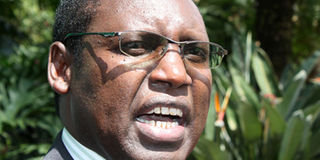Initiative to boost climate change fight

Africa Carbon Exchange chairman Job Kihumba addresses journalists during the launch of Africa Carbon Exchange at a Fairview Hotel on March 24, 2011. Kenya is set to benefit from the emerging carbon markets. SULEIMAN MBATIAH
Kenya’s efforts to tackle climate change has received a major boost with the launch of a new initiative expected to facilitate the trading of carbon credits.
The African Carbon Exchange, the first of its kind in Africa, will assist the country to trade their carbon credits.
Carbon trading is a practice where companies, which exceed their emission limits, buy credits from those who pollute less. The buyer is essentially charged for polluting while the seller is rewarded for reducing emissions.
Environmentalists in the country say that trade in carbon credits will open up investment in the generation of renewable energy and forestry projects.
They for example say that Kenya can make up to Sh10 billion per year in the international carbon trading market if its water towers are conserved. The Mau Forest complex alone can earn Sh4 billion a year.
On Thursday, Job Kihumba, the chairman of the exchange said: “We plan that the initiative will provide a platform where environmental products will be electronically traded just like financial assets at traded at the stock exchange.”
“We hope to provide the players in the carbon market industry an opportunity to exchange ideas on the best practice in the exercise of their trade.”
Scientists say carbon dioxide is one of the main gases causing climate change and such exchanges, where polluting industries in rich countries pay for clean development projects in poor countries, are one way to offset carbon emissions.
Under the terms of the Kyoto Protocol, when the equivalent of one metric tonne of carbon dioxide or other greenhouse gases is prevented from entering the atmosphere during a production process, carbon credits in the form of certificates are issued.
These acquired carbon credit certificates may thereafter be traded at a carbon market (or exchange), which is similar to the Stock Exchange.
Mr Kihumba said in making the effort to succeed, they will be encouraging Kenyans to reduce their carbon footprint by either using more energy efficient technologies or by engaging in reforestation.
His remarks were backed by Forestry and Wildlife PS Mr Mohammed Mwachai who said the initiative will increase the continent’s share of business in the emerging carbon markets.
“We will use the carbon markets to conserve the Mau forest and other major water towers on a long term basis instead of relying on donor funds,” he said.
The initiative is later on expected to be replicated to other countries through regional trading blocs like East African Community, Common Market for Eastern and Southern Africa and the Economic Community for West African States.
Some forecasts warn that Africa will be badly affected by climate change, even though most of the greenhouse gases, which cause it are produced in the West and Asia.




